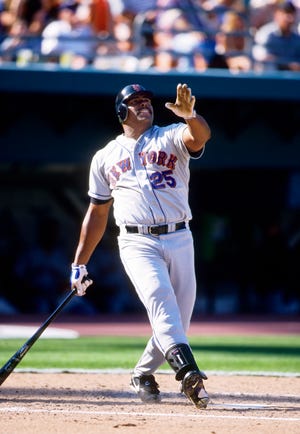Bobby Bonilla has not played for the New York Mets in 25 years, but the 61-year-old former third baseman and outfielder is collecting another paycheck on Monday.
July 1 is an anniversary of sorts for the Mets. It’s Bobby Bonilla Day, of course.
Bonilla will receive another $1.19 million from the organization as part of a contract agreement made between the player and the Mets back in 2000.
So who is Bonilla, and why do the Mets continue to pay him each year? Let’s break it down:
Who is Bonny Bonilla?

Bonilla spent 16 seasons in Major League Baseball, beginning with the White Sox in 1986 before his best seasons of his career with the Pirates between 1986-91.
During that time, he earned four of his six All-Star selections and twice finished in the top-3 in National League MVP voting. Arguably his best season came in 1990 when he slashed .280/.322/.518 with 32 home runs, 120 RBI and 112 runs.
Those strong seasons led the Mets to ink Bonilla to a five-year, $29 million contract in 1991 — then the richest contract in franchise history. Bonilla earned two All-Star selections as a member of the Mets, including 1994 when he finished with 34 home runs and 87 RBI.
Bonilla was traded to the Orioles in July 1995 and bounced between six teams, including a World Series title with the Marlins in 1997 and a trip back to the Mets in 1999, during the final six seasons of his career.
Why do Mets pay Bobby Bonilla every year?
After Bonilla’s return to the Mets in 1999, the team worked out a deal where they would defer the payment of $5.9 million owed to him with 8 percent interest over the course of 25 years between 2011-35.
Then-Mets owner Fred Wilpon was hoping that investments made with Bernie Madoff would help cover those costs year over year. But the team’s funds were wrapped up in Madoff’s Ponzi scheme and the value of that contract swelled to $29.8 million to be paid across 25 years, or $1.19 million.
What other players have deferred payments in MLB?
Bonilla’s contract is one of the most famous deferred-money contracts in baseball, but it is not the only one.
Before this season when Shohei Ohtani signed his record $700 million contract with the Dodgers, he agreed to defer 97 percent of the value, deferring all but $2 million annually. That means he will be paid the remaining $680 million of his deal (without interest) between 2034-43.
Ohtani’s deal gives the Dodgers financial flexibility to try and secure win-now players while Ohtani is on the team. It likely helped the team in landing Japanese standout pitcher Yoshinobu Yamamoto, who inked a 12-year, $325 million deal with the team.
Freddie Freeman also has a deferred $57 million that is looming on the Dodgers’ bookes.
The Nationals are still paying Max Scherzer $15 million per year through 2028 and Stephen Strasburg $26.6 million between 2027-29.
Notably, Francisco Lindor’s contract includes $5 million deferred between 2032-41.





